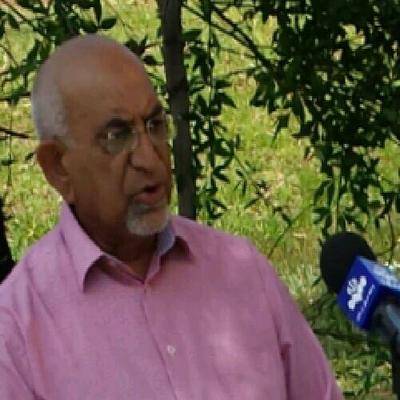How much longer is the South African government going to ignore violations of the Foreign Military Assistance Act by local citizens serving in Israel’s Apartheid army? This is a serious question.
Seven years ago a high profile group of South Africans reached some damning conclusions about Israel following their fact-finding mission to most of the Occupied Palestinian Territories. Gaza was excluded due to Israel’s bureaucratic conditions.
The visit was facilitated by Open Shuhada Street South Africa and the Heinrich Boell Foundation, and included meetings with civil society organisations, human rights activists and locals, Palestinians and Israelis alike. The delegation was made up of anti-apartheid activists Barney Pityana, Vusi Pikoli and Firoz Cachalia; civil society leaders Vuyiseka Dubula, Brad Brockman and Adila Hassim; politician Mbali Ntuli; author and political analyst Christi van der Westhuizen; and activists Adaiah Lilenstein, Bruce Baigrie and Keren Ben-Zeev.
At the time they noted that Israel’s military occupation and expanding settlement of the Occupied West Bank and East Jerusalem eroded the viability of a two-state solution. In fact, seven years down the line, with intensive expansion of settlements which in effect are large scale Jewish residential and commercial hubs deep inside Palestinian territory, has made an unworkable Bantustan option for the indigenous Palestinian population an ongoing nightmare.
In a public statement the group reported that instead of finding the Palestinian Authority in charge of the West Bank, it is the Israeli government and the Israel Defence Forces (IDF) which are in control of the affairs of the Palestinian population. “Soldiers are seen everywhere,” they reported. “The West Bank is dotted with a network of military checkpoints, surveillance cameras, watch towers, segregated roads and a very high concrete wall that cuts across the territory annexing parts of the West Bank, including East Jerusalem (part of the Palestinian territory according to international law), to Israel.”
READ: Israel’s observer status at the African Union is a major blunder
They found that repressive measures such as the restriction of free movement by Palestinians through a permit system and ID cards relegates them to residents, as opposed to citizens. “We witnessed Palestinians being herded through checkpoints in a system that is no better than cattle pens.”
Although Israel is widely characterised today as an Apartheid regime by leading international legal experts, including Israeli NGO B’Tselem and Human Rights Watch, it is important to recollect the eyewitness account of the SA delegation: “Palestinian civilians are under military law, which is discretionary and arbitrary and they rely on the institutions of the Israeli occupation for most services, as the Palestinian Authority has limited powers. Israeli military courts are run by soldiers and traffic offences are tried by military courts, which have no system of due process and do not comply with the rule of law. People resisting the occupation are also tried in the military courts.”
The military element of Israel’s brutal oppression was also documented succinctly, as indeed were the stark discriminatory laws. Palestinians are detained in terms of military codes and face random decisions and postponement of their cases or procedures such as “administrative detention”, which allows them to be imprisoned for indefinite periods without access to proper legal representation, and neither charge nor trial, wrote the delegation. Moreover, applications for permits to leave the West Bank for work and other purposes have to be made to the military administration. In contrast, Israeli settlers in the West Bank are under civilian law and enjoy all basic rights like their fellow Israeli citizens.
![A protest calling for the boycott of Israel in Johannesburg, South Africa on 31 May 2019 [Afro-Palestine Newswire Service]](https://i0.wp.com/www.middleeastmonitor.com/wp-content/uploads/2020/11/Israel-BDS-south-africa.jpg?resize=920%2C613&ssl=1)
A protest calling for the boycott of Israel in Johannesburg, South Africa on 31 May 2019 [Afro-Palestine Newswire Service]
Although I’ve highlighted a few key parts of this comprehensive yet biting report, one wonders why the ANC-led government has to date failed to incorporate and implement the crucial demands made by the delegation to help bring about an end to the military occupation of the West Bank and Gaza, which remains under illegal blockade, and the removal of all illegal settlements.
READ: Normalisation and the betrayal of Palestine by Arab despots
The delegation called for the South African government to support the international Boycott, Divestment and Sanctions (BDS) campaign against Israel until international law is followed. Israeli society continues to be largely complicit in the maintenance of the occupation and Israeli politics remains dominated by the right and far-right parties. Thus, the international community must make the occupation economically, politically and morally costly for Israel until it is dismantled.
As noted above, the South African government should be consistent in its application of all relevant legislation, including the aforementioned Foreign Military Assistance Act (FMAA). This point is particularly relevant as there ought not to be any legal impediments to apply the provisions of the Act, which is intended to prohibit illegal mercenary activities. South African citizens deployed in Israel’s army in direct violation of the FMAA should not be allowed to continue to make a mockery of our legislation.
B’Tselem makes it clear that the Israeli regime enacts an apartheid regime in of all the territory it controls — Israeli sovereign territory, East Jerusalem, the West Bank and the Gaza Strip — and apartheid is on a par with crimes against humanity. The underlying principle of a wide array of Israeli policies is the advancement and perpetuation of “a regime of Jewish supremacy” over the Palestinians. South Africa’s ANC-led government must do all within its power to bring this to an end.
The views expressed in this article belong to the author and do not necessarily reflect the editorial policy of Middle East Monitor.

![Protesters gather and hold Palestinian flags in central Johannesburg, on May 23, 2021, as they take part in a counter protest in response to a demonstration organised by the South Africa Zionist Federation. [MICHELE SPATARI/AFP via Getty Images]](https://i0.wp.com/www.middleeastmonitor.com/wp-content/uploads/2021/12/GettyImages-1233062954.jpg?fit=920%2C613&ssl=1)







